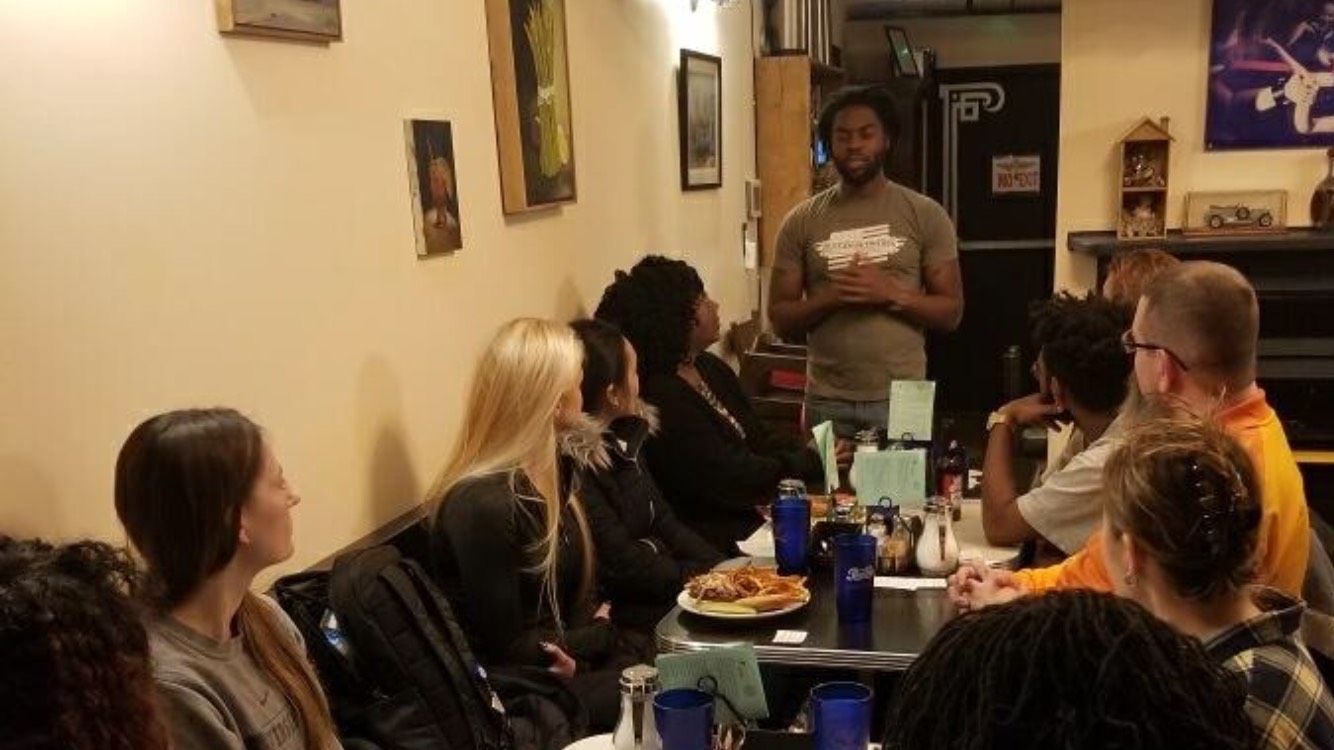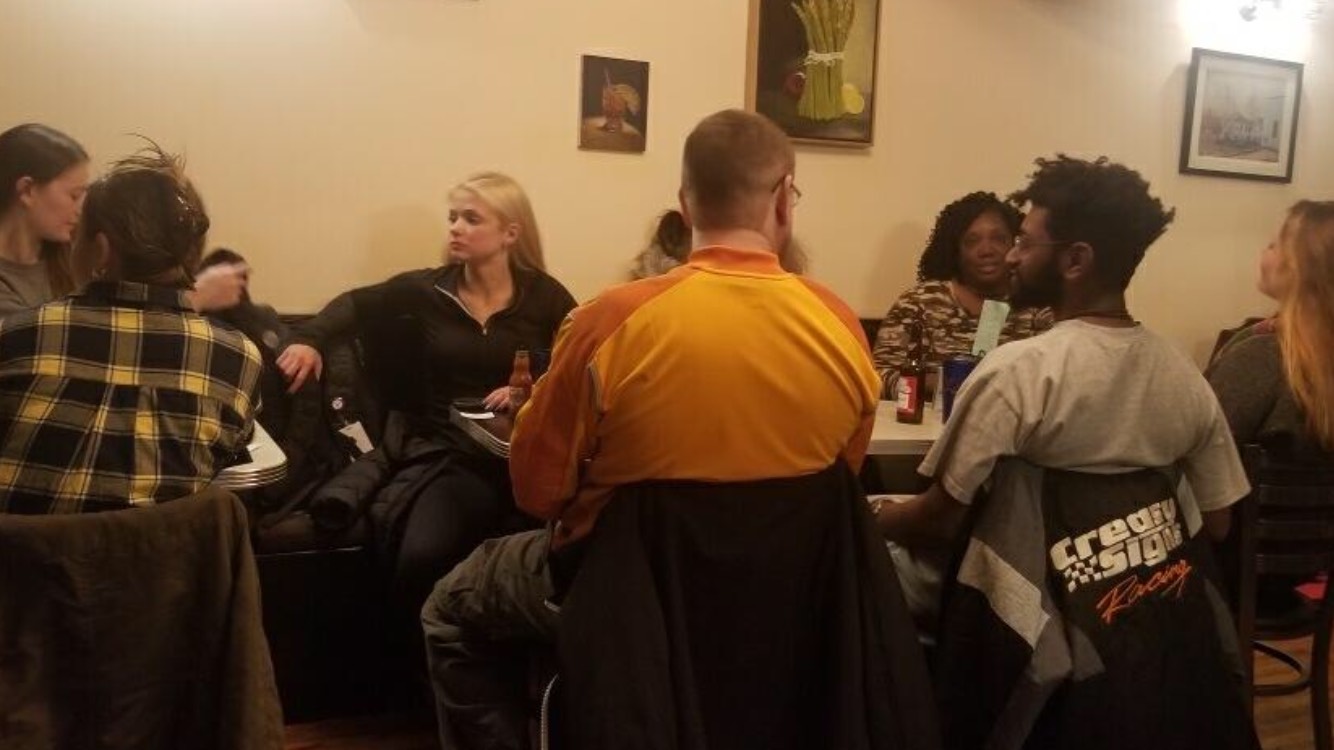A year ago my friend Julie Caruccio (you know, Julie, the Assistant Vice President of Student Affairs; Associate Dean of Students– no big deal) wrote to me “I’d like to formally invite you to collaborate with us on the development of a training program for students interested in doing community engagement.”
This was an exciting moment for me professionally. I remembered finishing my doctorate 15 years ago, and asking myself and my adviser, what am I even doing? Am I even using my education? My adviser assured me that I was okay– that my path would make sense, and that all my experiences would lead me to where I was supposed to go. There’s so much internal and external pressure to “use” your education. As if education isn’t an exercise for each of us to understand our selves and our skills better, that is an end to itself, and doesn’t have to be commodified. I’ve always had a defensive, uncomfortable, and complicated reaction to the combination of holding a PhD and service industry jobs. I honestly don’t think that my degree makes me smarter or more valuable as a human. And yet, I find myself simultaneously wanting recognition for my achievement, and the recognition of the humanity of my fellow service workers regardless of formal educational attainment. Also, I am ambitious– I know that my skills and experience in education and community building could be applied at the university level, even as I am uninterested in and unsuited for the typical academic track. Being recognized as having expertise in training and community engagement was important and meaningful to me.
Julie and I began meeting with a student intern, Maggie Hirshland, and, after her maternity leave, another Student Affairs staffer, Rose Cole. After a week or two of listing frustrations stemming from a couple decades of working with UVA students and faculty (a partial list at bottom), I made a mental shift– remembering that the UVA undergraduate population are an age group that I love, and that they are smart, still developing, and in “education mode”. This realization made me view this work as an opportunity to teach, not just chastise.
Over the course of the spring semester, we worked together to visualize what effective student training for community engagement would look like in the particular environment of UVA. I thought about the internal work we must do for our idealized beliefs to become concrete actions. I thought about what respect looks like in practice. I thought about how our insecurities and discomfort negatively affect the way we move through the world. I thought about how it’s so much more powerful to frame suggestions in positive action to enact, as opposed to as a list of “nos” and “nots”. As I reflected, my thoughts coalesced into a framework to guide thinking before, during and after community engagement. I’ve been fortunate to present this framework in a number of Melissa Levy’s classes within the Youth Development Program, and have applied it in community work.
In the Fall, Julie followed up on one of our ideas of putting on an evening series similar to BE’s study groups, compensating me as a Community Fellow. On Tuesday nights from January to May, we’ll be meeting in the back room of the Blue Moon Diner. I’ve got an amazing slate of Community Members doing work that supports, honors, and nurtures our greater community in a multiplicity of ways. They will present about their work, with time built in for dinner attendees to get to know one another, and to generate ideas that authentically connect the University and greater Cville communities. I plan to reflect on each week’s presentation here. The name of the organization links to some material on each presenter. As they present, their name will link to my reflections. The amazing slate so far includes, these fabulous humans:
UVA students, register for dates in the series here. Community Members, please join us. I appreciate a message letting me know you’re coming, but spontaneity is okay too!
Historical Challenges of Working with UVA students, faculty, staff (an incomplete list)
- Hierarchical Thinking This shows up as UVA-affiliated peeps thinking that they are smarter, more experienced, more capable, more competent, etc., which in turn leads to savior complex.
- Access to Resources/Systems UVA peeps have access to space, tools, printing, money– this is not without a cost (hello student debt), but there is an assumption that systems and resources available to UVA’s institutional purchasing power is available to local organizations and individuals. A lack in the community may not be due ignorance, the lack can be due to lack of resources, or a mindful prioritization of different resources or values.
- Compensation I gave free labor to UVA for many years. It’s sorta like when artists are encouraged to do work for free for “exposure”. When a school has a $9.6 billion endowment, and a $3.5 billion annual budget (!!!), that they can’t pay local content experts $100 to share their knowledge is kinda crazy. Not only is getting promise of compensation in the first place challenging, but the logistics of getting paid is incredibly difficult. I’ve gotten paid 3 different ways in the course of the year. When I do get paid, I get a 1099 at the end of the year, which results in having to file taxes, sometimes a tax penalty, and an additional fee for running a business. Some of this is not the University’s fault, it’s just something that anyone doing work with the University has to factor into their financial well-being. (I’m focusing here on people not employed by/affiliated with the University, but plenty of wage workers, adjunct faculty, staff, student athletes, undergraduates and grad students are under-compensated for the labor that they are doing for the university. That the history of UVA is rife with sexism, classism and racism and that marginalized people, especially Black People, have been exploited for their labor cannot be over-emphasized in these conversations.)
- Extractive Processes This shows up when the University (students, faculty, staff, administration) benefits more from “community” projects than the actual community does. Community members’ resources come in the form of information, time, stories, money, land, data from unconsented experiments, emotional labor, good will. At the root of this is hierarchical thought and practices. The University in all its forms benefits through resume lines, network building, grant-funding, control of community resources, and an outsized voice in community decision-making due to power and perceptions of expertise.
- Longevity of Relationships Undergraduate students are here for anywhere from 2 to 6 years depending on transfer status and how long it takes to complete course work. Each “year” can be as short as two 15- week semesters with their own obligations and deadlines. Students have all sorts of other obligations– travel home or to study abroad programs, work opportunities and obligations, varying weekly schedules, exams, etc. All of this is a completely different rhythm than much of the greater cville community, which has public school schedules, calendar years, fiscal years, and generations of living life. It can be very hard to sync up the competing timing needs of the different worlds.

